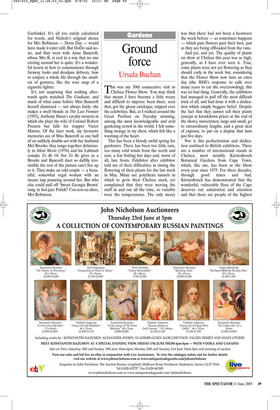Slow lane
Mark Steyn
Swimming Upstream 12A, selected cinemas Ilove Australia, and I used to love Australian movies. But a certain stiffness seems to have set in. Swimming Upstream has two terrific actors, Geoffrey Rush and Judy Davis, and they’re never less than compelling, but Russell Mulcahy directs with a plonking clunkiness that makes the material even more pedestrian than it is. Perhaps he was intimidated by his screenwriter/producer Tony Fingleton, who also co-wrote the book on which the movie is based and whose life story this is.
Tony was a champion swimmer four decades back, Silver Medallist at the 1962 Empire Games in Perth. Then he gave up the backstroke, got a scholarship to Harvard, stayed in America, wrote a film for Rik Mayall and became Lauren Bacall’s agent. Then he wrote a bestselling book about the living hell of ... being Lauren Bacall’s agent? Alas, no. The book, co-written with his sister Diane, was about the living hell of their childhood. Yawn. Dad was an abusive alcoholic scarred by his own mother’s whoring. Mum was longsuffering: every time Judy Davis appeared on screen in her threadbare housecoat, I had an urge to sing, ‘She may be weary, women do get weary wearing the same shabby dress ... ’ How damaged the children were is hard to tell: Tony’s done just fine and the sister he wrote the book with became Queensland’s first female Chief Magistrate, though she was subsequently jailed for ‘retaliating against a witness’. Perhaps that’s why her role in the movie’s been pared back to nothing.
Instead, we see young Tony playing the ‘Minute Waltz’ because his mum likes it. Unfortunately, his big brother Harold doesn’t. ‘You a poofter?’ he sneers, and slams the piano lid on his fingers. Dad likes sporty sons, and Tony is lousy at boxing and football. Then pa discovers the piano-playing sissy is a strong swimmer and orders him to the municipal pool. ‘But it’s my piano lesson ... ’ ‘Forget that. You’re not gonna be a poofter,’ says dad.
But even the backstroke can’t redeem Tony: dad wants the other brother, John, to be the swimmer, and eventually the siblings go head-to-head at the Oz championships. Whatever the truth of all this, its dramatic power dribbles away in a film about ‘abuse’ that never has any real sense of danger and starring a ‘victim’ who (as played by Neighbours’ Jesse Spencer) sleepwalks through the movie with an irritatingly self-regarding preciousness.
Anne Bancroft died of cancer on Monday, far too young and still effortlessly sexy. You wouldn’t know that from the old-lady cameos (GI Jane, Home for the Holidays) she settled into prematurely, though not as successfully as she embraced premature predatory middle-age in The Graduate (1968). Opinions vary on her performance in that signature role, but I think it’s very shrewdly judged — it’s a beautiful trick to be able to be quite so wearily seductive, bored and peremptory and yet also feline and desirable. I didn’t fully appreciate it until that stage version fetched up in the West End — the various women of a certain age (Linda Gray was the best) stepping into Miss Bancroft’s hosiery could handle the sex but never grasped the tart ennui.
The Bancroft performance balances an already somewhat self-conscious turn by Dustin Hoffman, though it’s less mannered than his later efforts. It also helps that Katharine Ross is so vapid as the Robinsons’ daughter. The Graduate was the first and best of Mike Nichols’s attempts to skewer — or at least package — a moment in the culture. And he put it together as expertly as a Tina Brown dinner party: an eccentric novel by Charles Webb but given a conventional Hollywood comedy adaptation by Buck Henry but decked out with sorta kinda New Wavish directing tics by Nichols but hepped out by every suburban cul-desac’s favourite pop duo Simon and Garfunkel. It’s all too cutely calculated for words, and Nichols’s original choice for Mrs Robinson — Doris Day — would have made it cuter still. But DoDo said nono, and they went with Anne Bancroft, whose Mrs R. is real in a way that no one circling around her is quite. It’s a wonderful lesson in how to communicate through faraway looks and deadpan delivery, how to conjure a whole life through the smallest of gestures, like the sour snap of a cigarette lighter.
It’s not surprising that nothing afterwards quite matched The Graduate, and much of what came before Miss Bancroft herself dismissed — not always fairly: she makes a swell blonde in The Last Frontier (1955), Anthony Mann’s cavalry western in which she plays the wife of Colonel Robert Preston but falls for trapper Victor Mature. Of the later work, my favourite memories are of Miss Bancroft as one half of an unlikely double-act with her husband Mel Brooks: they tango together deliciously in Silent Movie (1976) and his Lubitsch remake To Be Or Not To Be gives us a Brooks and Bancroft duet so daffily irresistible the rest of the picture can’t live up to it. They make an odd couple — a beautiful, somewhat regal woman with an insane imp prancing around her. But who else could pull off ‘Sweet Georgia Brown’ sung in hot-jazz Polish? Coo-coo-ca-choo, Mrs Robinson.



















































 Previous page
Previous page